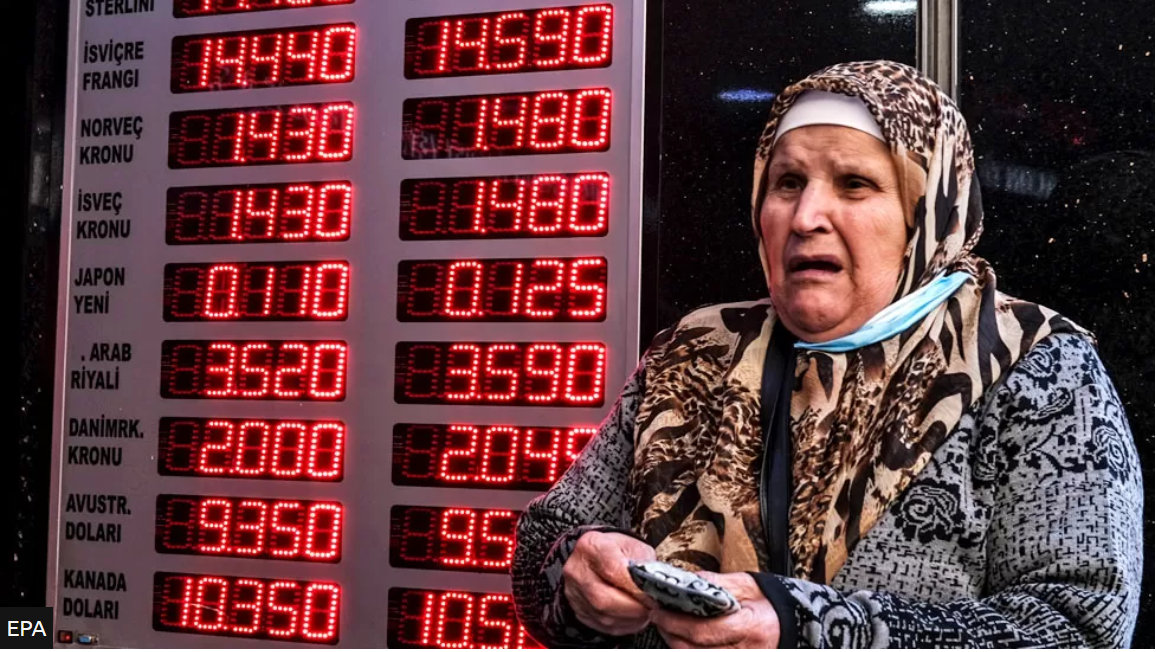“Is anyone buying dollars?” yells a man in a Galatasaray sports jacket as he leans against the bazaar’s 500-year-old stone wall. “I’ll buy, but only this evening,” yells another. “I’m ready to buy dollars at 2pm – anyone want to buy? 2pm anyone?” shouts a third trader.
“There’s a liquidity problem. People are trying to sell, but they can’t so it’s getting tense,” mumbles a gold trader named Erdal as he passes by to observe the frantic crowd, before returning to the gold market in the next alleyway as it begins trading.
In the three weeks since the Turkish president, Recep Tayyip Erdoğan, was re-elected to begin his third decade as leader, the value of the lira has tumbled, falling an estimated 16% against the dollar after the first round of the elections in mid-May, according to the Fitch ratings agency.
The country is reeling from a profound economic crisis. The lira halved in value two years ago and inflation is officially at 39.59%, although unofficial estimates from Turkey’s Inflation Research Group put it at more than 100%.
“Right now, it’s about 23.5 lira to the dollar, but there are firms trading it at 25-30 to the dollar as an investment in the future, and it’s making things worse,” said Erdal, leaning back on a torn leather office chair in a cloud of cigarette smoke as he waited for the gold market to open. Overhead, another trader leaned around the tangle of electrical wires obscuring the bazaar’s painted stone arches to polish the metallic lettering above a shop.
Things were frantic before the election, said Erdal, as crowds of people nervous about the economy flocked to the bazaar to change their money into dollars. According to the Turkish financial outlet Ekonomim, the Turkish central bank itself transported 5bn lira to the Grand Bazaar in order to exchange it for dollars, amid a biting foreign currency shortage that persists today.
Now, in a strange state of suspended animation, the traders and the country are waiting to see how the new government might change course on the economy before a much-anticipated central bank meeting on 22 June.
Erdal’s dislike of currency speculators did not stop him or other traders deciding to privately invest using their knowledge of the market. “A few weeks ago, we knew the price of the dollar would increase, so we prepared and invested accordingly,” he says. “When it was worth 18 or 19 before the election, we bought dollars. When it hits 30, I’ll sell. Right now I’m just waiting.”
The traders all nod sagely at the mention of the finance minister, Mehmet Şimşek, whose reappointment to Erdoğan’s cabinet was intended to signal a shift towards more orthodox economic policies, as well as an end to the government using reserves to support the lira. Şimşek’s main task, along with the new central bank governor, Hafize Gaye Erkan, appears to be convincing Erdoğan of a desperate need to raise interest rates in order to combat inflation.
“I believe Şimşek needs to raise interest rates – but it might not be enough. We need at least a five-percentage-point raise,” says the trader Cafer Deniz. Others, notably economists from JPMorgan, say a far higher increase of 25% is “on the table for 22 June or earlier”.
Speaking to reporters on his way back from Azerbaijan, Erdoğan told of his willingness to help Şimşek succeed, but paradoxically also stated that “my mind remains unchanged” on issues of orthodox economic policy. He added: “Regarding the present outlook of our minister of treasury and finance, however, we approved that he should take the steps he intends to take with the Central Bank as soon as possible, we wished him success, and we informed him of our resolve to reduce inflation to single digits.”
The difference between a shift in personnel and policy persists. Erkan is Turkey’s fifth central bank governor to be installed since the economic crisis began in 2018, amid Erdoğan’s increasing influence over the role. Like Şimşek, she has worked in the US. A former employee at Goldman Sachs, she was co-CEO of First Republic Bank, leaving the year before it collapsed, and is named in a class-action lawsuit related to the debacle.
The ratings agency Fitch said: “The previous central bank governor remains in the economic management team as head of the financial regulator. Hence, it will take time to determine the durability of any policy shift.”
Other traders in the bazaar, desperately reliant on the annual influx of tourists to bring in foreign currency, are feeling less positive about the state of the economy.
“In this period after the election I’d say we’re having the worst season in our history. There are days where we go the entire day without making any sales,” says Hasan Karablut, standing with his arms crossed next to a pile of fake designer shoes. In addition, he says, wholesale prices of products imported from China are rising fast, as well as shipping costs.
“When the dollar is high, tourists should want to come here and buy things. But it’s not happening right now. I’ve been in this business 25 years, I’ve never seen anything like this before. Three days ago I didn’t make any sales; I closed my shop early and went home.”
Excerpt from “Anyone want to buy?’: Turkish lira falls as traders await uplift in economy”
